 Petzlover
Petzlover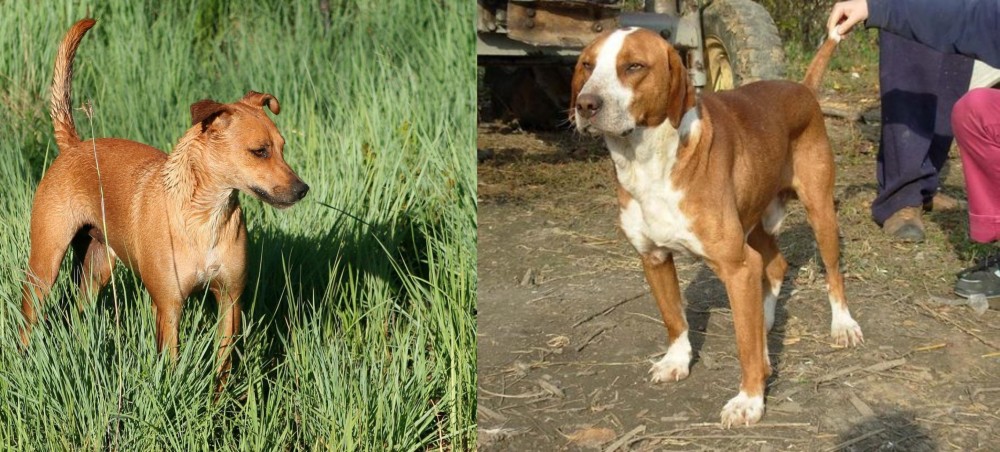 Africanis is originated from South Africa but Posavac Hound is originated from Croatia. Both Africanis and Posavac Hound are having almost same height. Africanis may weigh 25 kg / 56 pounds more than Posavac Hound. Both Africanis and Posavac Hound has almost same life span. Both Africanis and Posavac Hound has same litter size. Both Africanis and Posavac Hound requires Low Maintenance.
Africanis is originated from South Africa but Posavac Hound is originated from Croatia. Both Africanis and Posavac Hound are having almost same height. Africanis may weigh 25 kg / 56 pounds more than Posavac Hound. Both Africanis and Posavac Hound has almost same life span. Both Africanis and Posavac Hound has same litter size. Both Africanis and Posavac Hound requires Low Maintenance.
 Africanis is one of the original African breeds. This breed was not shaped by humans, but they went through the process of natural selection. Humans did not affect this breed by standard breeding practices. Through the history, this breed became stronger and stronger because only the strongest of the breed survived. Africanis descent is the early dog that is originally from ancient Egypt. Approximately 4500 BC was the period of first data about this breed.
Africanis is one of the original African breeds. This breed was not shaped by humans, but they went through the process of natural selection. Humans did not affect this breed by standard breeding practices. Through the history, this breed became stronger and stronger because only the strongest of the breed survived. Africanis descent is the early dog that is originally from ancient Egypt. Approximately 4500 BC was the period of first data about this breed.
As time passes through, Africanis became more and more popular through the whole continent. This breed migrated with people for thousands of years, and now, a modern Africanis is similar to Greyhound dog. The original Africanis can be found in tribes and more traditional people. One of the oldest breeds in the world is one of the lasts that has been recognized by Kennel Union of Southern Africa.
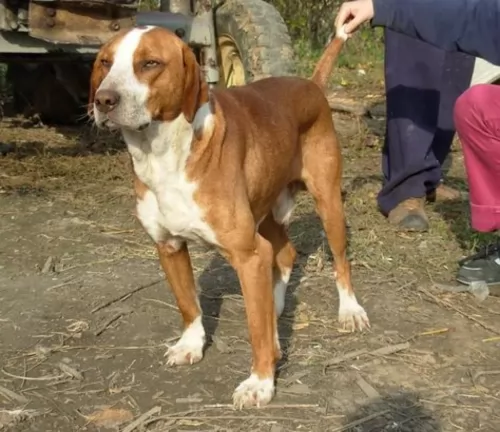 The Posavac Hound originates from Croatia and is believed to have descended from the Molossian.
The Posavac Hound originates from Croatia and is believed to have descended from the Molossian.
The name Posavac Houndare or Posavac Hound was a name bandied about and the name was officially recognized in 1969 by the Federation Cynologique Internationale.
The dog was categorized as a Scent hound. The breed is unrecognised by any of the UK or US Kennel Clubs.
 Africanis origins from South Africa. The average Africanis weights 25-45 kg, with a height of 50-60cm, while females are slightly smaller. They are medium sized dogs who are friendly, but also independent and territorial. They can are good pets for training, but it requires persistent work.
Africanis origins from South Africa. The average Africanis weights 25-45 kg, with a height of 50-60cm, while females are slightly smaller. They are medium sized dogs who are friendly, but also independent and territorial. They can are good pets for training, but it requires persistent work.
The lifespan of Africans is 10-12 years, but lifespan always depends on health, genetics, and care of the dog. Therefore, if they are healthy and well cared they can live longer than average.
Litter Size variates a lot, so female can have 2-8 puppies.
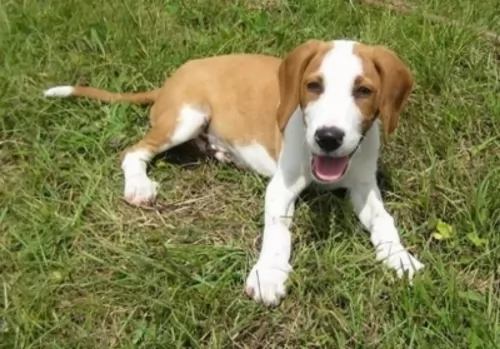 Although the Posavac Hound is a rare dog breed, people who have owned the dog say it should be far better known as it is a gem of a dog.
Although the Posavac Hound is a rare dog breed, people who have owned the dog say it should be far better known as it is a gem of a dog.
The Possie as he is fondly referred to as, is a solidly built dog resembling the Beagle. He stands at between 43 - 59 cm and weighs 16 - 20 kg.
He has long, floppy ears and a kind, gentle expression on his face. The coat is short and smooth, being slightly longer on the stomach and around the back of the legs. The coat color is a wheaten, cream shade. He has bright brown eyes and a long tail, often with a white tip.
The Posavac may look gentle, but in character he is happy and enthusiastic. He makes the most wonderfully faithful, loving dog. He likes to be busy too, game for all kinds of activities but he is intelligent as well. He responds well to training and socialization.
People who have owned this dog say he has a truly amazing temperament, being eager to please his human owner. You’ll find him getting along well with children and other pets in the home.
 Africanis is a very good and healthy breed. They are very intelligent and friendly breed. They are not an aggressive breed, but they tend to protect the master. Africanis is a natural guard dog. This breed is used to being alone because for the centuries they migrated close to humans, but they also have been independent.
Africanis is a very good and healthy breed. They are very intelligent and friendly breed. They are not an aggressive breed, but they tend to protect the master. Africanis is a natural guard dog. This breed is used to being alone because for the centuries they migrated close to humans, but they also have been independent.
Training Africanis is not very hard. They tend to learn very quickly. Positive training with awards is the best way to train your Africanis. The old-fashioned way of training dogs with punishment is not recommendable for Africanis. They are intelligent breed who requires patience and constancy.
They are very good with other animals too, but they need proper socialization. Africanis requires daily exercise so if you keep your dog in the apartment it should have few daily walks. Africanis can live in the apartments though.
Overall, they are very healthy breed, so with regular vet checks and proper care, they are perfect pets for the whole family since they are great and gentle with small children and kids.
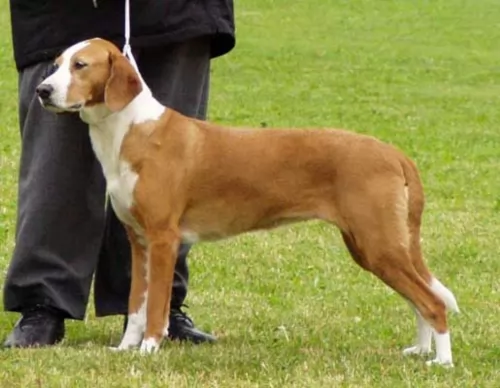 People who have kept the Posavac as a pet say he has wonderful features which make him a sought after canine friend.
People who have kept the Posavac as a pet say he has wonderful features which make him a sought after canine friend.
He has always been a working dog and he is confident and assured, independent, social and friendly. He makes a great friend of children and gets on well with other pets in the house.
He thrives on activities and doesn't want to be left to just lie around ignored. He becomes frustrated and destructive. It wont be the dogs fault but the owners. If you're looking for a lively, friendly, loving dog, you’ll find the Posavac a great addition to your home.
 The great thing about Africanis is that this breed is very healthy. Thousands of years of evolution made this breed one of the toughest breeds in the world. They can survive very tough conditions. Africanis has a very healthy immune system too. It evolves so strong that there are no internal or external parasites that can harm the dog.
The great thing about Africanis is that this breed is very healthy. Thousands of years of evolution made this breed one of the toughest breeds in the world. They can survive very tough conditions. Africanis has a very healthy immune system too. It evolves so strong that there are no internal or external parasites that can harm the dog.
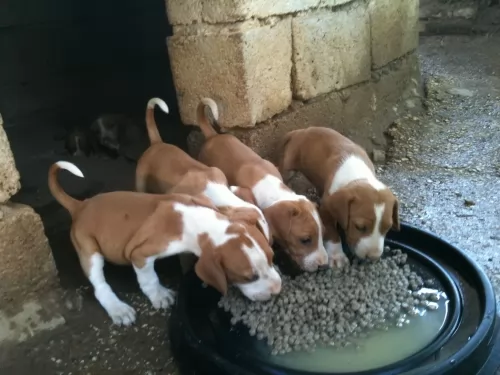 You won’t find many health disorders linked to this lovely dog. He can reach 11 – 14 years of age fairly easily if well taken care of. Of course, his floppy ears pose a bit of a problem.
You won’t find many health disorders linked to this lovely dog. He can reach 11 – 14 years of age fairly easily if well taken care of. Of course, his floppy ears pose a bit of a problem.
It is quite difficult to keep the inside of the ears dry and clean, and this means dirt, wax and moisture can cause bacteria and ear infections.
Because he is also a deep chested dog, he can be prone to bloat. Bloat is when gas collects in the stomach and it twists. You will notice your pet’s abdomen swollen and hard. He will require immediate veterinary attention.
 Africanis has used to eat everything, so this breed does not require any special treatments. 2-2.5 cups of dry high-quality food would be more than enough to have healthy and well feed the dog. But have in mind that feeding the dog depends on daily activity and size. If the dog is more active, an extra cup wouldn’t be a problem for a dog to eat.
Africanis has used to eat everything, so this breed does not require any special treatments. 2-2.5 cups of dry high-quality food would be more than enough to have healthy and well feed the dog. But have in mind that feeding the dog depends on daily activity and size. If the dog is more active, an extra cup wouldn’t be a problem for a dog to eat.
Africanis puppy should eat more times per day than an adult dog. 3-5 meals per day of quality dry food are good measure to feed your puppy Africanis.
Since Africanis has short hair they are very easy to groom and care. Few brushes on a weekly basis with occasional bathing would be more than enough to have a clean and healthy dog.
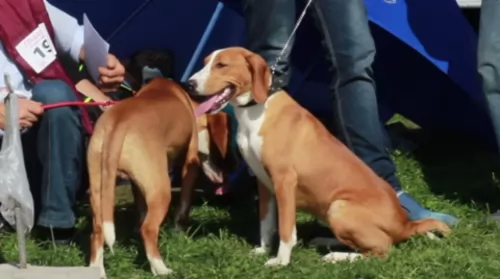 Your Posavac Hound is going to need lots of exercise. He’s used to being a working dog and being kept busy. A good walk will delight him, but it won’t be enough. If you go cycling or riding on a horse, you can count him in to run alongside you. He will also plunge into the swimming pool with you.
Your Posavac Hound is going to need lots of exercise. He’s used to being a working dog and being kept busy. A good walk will delight him, but it won’t be enough. If you go cycling or riding on a horse, you can count him in to run alongside you. He will also plunge into the swimming pool with you.
While he can adapt to life in the city, he is essentially a country living dog, loving to get outside and be active.
Because of the short, smooth coat, and being an average shedder, the Posavac will only require a brush twice a week, so he is fairly low maintenance in terms of grooming.
Check for signs of an ear infection – redness inside the ear and your pet scratching at his ear can be signs,
Trim his nails.
Check inside his mouth for teeth problems. Bad teeth can create a host of problems.
Provide your dog with an excellent diet. It needs to be nutritious food if you’re going with a commercially manufactured dog food. High quality dry kibble can be excellet for your pet, but break the monotony by mixing in some home made food occasionally. Boiled chicken, brown rice or pasta, swee pototatoes, carrots and spinach, al chopped up and mixed in twice week with the drykibble can be awaited twice a week with yur pet. Raw meat added in sometimes can also contibute to your pets health. Feeding a dog doesnt have to be complicated. Dos thrive on consistency and simplicity and this diet will have him healthy ad hapy Make sure he always has a bowl of fresh, cool water available to him.